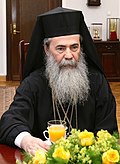His Most Godly Beatitude
| Patriarch of Jerusalem | |
|---|---|
| Bishopric | |
| orthodox | |
 |
|
 |
|
| Incumbent: Patriarch Theophilos III |
|
| Style | His Most Godly Beatitude |
| Cathedral | Church of the Holy Sepulchre |
| First incumbent | James the Just |
| Formation | 33 AD |
| Website | jerusalem-patriarchate.info |
|
Patriarchate of Jerusalem
Greek: ΠΑΤΡΙΑΡΧΕΙΟΝ ΙΕΡΟΣΟΛΥΜΩΝ
|
|
|---|---|

Coat of arms
|
|
| Founder | The Apostles |
| Independence | Apostolic Era |
| Recognition | Eastern Orthodox |
| Primate | Patriarch Theophilos III of the Holy City of Jerusalem and all Holy Land, Syria, beyond the Jordan River, Cana of Galilee, and Holy Zion |
| Headquarters | Jerusalem |
| Territory | Israel, Palestine, Jordan |
| Possessions |
United States, South America |
| Language | Greek, Hebrew, Arabic, English |
| Members | Estimated 130,000 People |
| Website | http://www.jerusalem-patriarchate.info/ |
|
Styles of The Patriarch |
|
|---|---|
| Reference style | His Most Godly Beatitude |
| Spoken style | Your Beatitude |
| Religious style | Patriarch |
| Posthumous style | N/A |
The Greek Orthodox Patriarch of Jerusalem or Eastern Orthodox Patriarch of Jerusalem, officially Patriarch of Jerusalem, is the head bishop of the Greek Orthodox Patriarchate of Jerusalem, ranking fourth of nine Patriarchs in the Eastern Orthodox Church. Since 2005, the Eastern Orthodox Patriarch of Jerusalem has been Theophilos III. The Patriarch is styled "Patriarch of the Holy City of Jerusalem and all Holy Land, Syria, beyond the Jordan River, Cana of Galilee, and Holy Zion." The Patriarch is the head of the Brotherhood of the Holy Sepulchre, and the religious leader of about 130,000 Eastern Orthodox Christians in the Holy Land, most of them Palestinians.
The Patriarchate traces its line of succession to the first Christian bishops of Jerusalem, the first being James the Just in the 1st century AD. Jerusalem was granted in 451 by the Council of Chalcedon and in 531 became one of the initial five patriarchates.
On the importance of Jerusalem in Christianity, the Catholic Encyclopedia reads:
During the first Christian centuries the church at this place was the centre of Christianity in Jerusalem, "Holy and glorious Sion, mother of all churches." Certainly no spot in Christendom can be more venerable than the place of the Last Supper, which became the first Christian church.
...
Wikipedia
